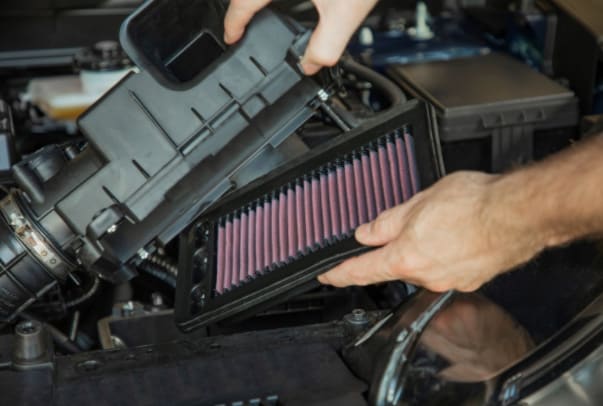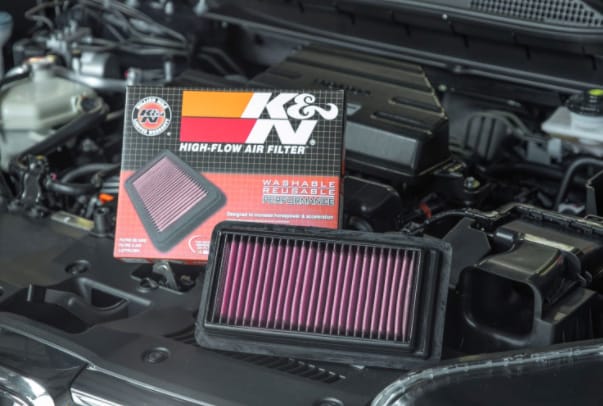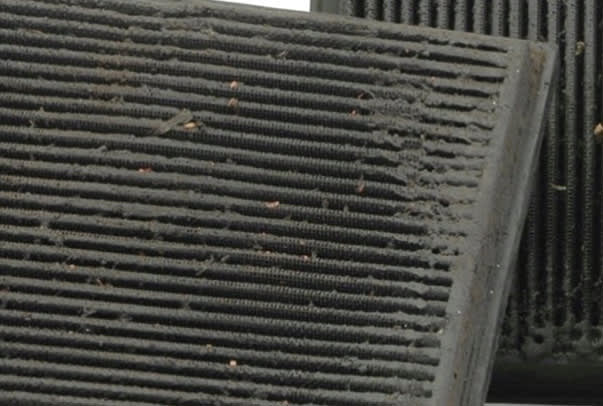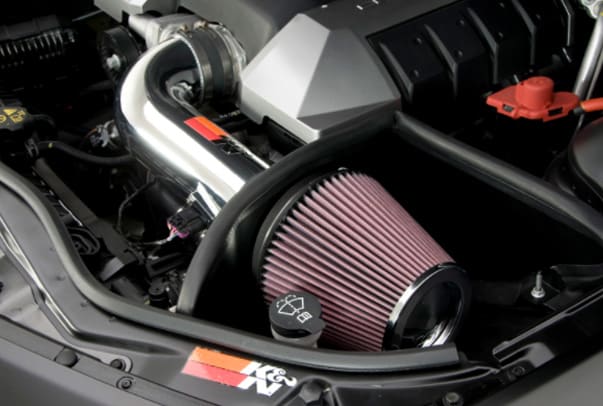We use cookies to make your experience better. To comply with the new e-Privacy directive, we need to ask for your consent to set the cookies. Learn more.
10 Questions & Answers About Engine Air Filters

- What is an engine air filter?
Engine air filters serve as a layer of protection against debris and particulate matter that could potentially damage a vehicle’s engine.
Essentially, engine air filters prevent anything that blows into a vehicle’s intake system from entering the engine cylinders. Common contaminants include bugs, dirt, dust, pollen, and more.
- How does an engine air filter work?
The heart of a vehicle is the engine. It’s vital to the overall health of a vehicle, and to function properly, engines need a steady flow of clean air. If the air is not filtered before entering the engine, particulate matter of any size could potentially clog the engine and cause serious damage.
Engine air filters solve this problem by trapping airborne contaminants and ensuring consistent airflow. The typical pleated design of an air filter increases the surface area for contaminant capture, while the filter’s materials contribute to the effectiveness of capturing microparticles.
- What are the differences between engine air filter types?
Paper air filters are typically the least expensive type of filtration product. Given the durability of materials, paper air filters are intended for a single-use and require routine replacement.
K&N washable filters can be reused for long-term use. They may also come in two forms: oiled or non-oiled. Though typically more expensive than paper filtration products up front, reusable filters often offer cost savings in the long run.
 The oiled-cotton K&N® High-Flow Air Filter™ pairs superior filtration with high airflow for enhanced vehicle performance.
The oiled-cotton K&N® High-Flow Air Filter™ pairs superior filtration with high airflow for enhanced vehicle performance. - How does an engine air filter improve performance?
Engine air filters play an important role in vehicle performance. If an engine air filter is dirty or missing, harmful debris can enter the engine cylinders and cause serious damage to the motor. Additionally, a high-quality filter can ensure that a powerful supply of clean air reaches the engine, thereby improving performance.
- How often do I change my engine air filter?
Average driving conditions warrant an air filter replacement about every 12-15,000 miles, which is roughly once per year (depending on driving frequency and location). For drivers in major cities or high-traffic areas, it may be necessary to replace an engine air filter sooner, potentially at around 6,000 miles. Other driving conditions may also affect the lifespan of an engine air filter, such as terrain and environmental factors. If you live in a particularly dusty environment, you may want to consider changing or servicing your filter more often.
Not all engine air filters require replacement. K&N® High-Flow Air Filters™ are designed to last the lifetime of a vehicle and are backed by a Million-Mile Limited warranty. With a simple cleaning every 50,000 miles (under normal highway conditions) they’ll perform virtually like new time and time again.
- How can I tell if my engine air filter needs to be changed?
Though replacing engine air filters is usually determined by mileage, there are some telltale warning signs that can indicate when a dirty filter needs to be washed or replaced. Dirty engine air filters can clog a vehicle’s engine and cause serious damage if left unchecked.
Dirty engine air filters can clog a vehicle’s engine and cause serious damage if left unchecked.
Decreased gas mileage is commonly linked to the engine air filter because reduced airflow puts stress on the engine. If you find yourself fueling up more often than usual, a dirty engine air filter could be the issue.
Excess exhaust smoke is another potential sign that an engine air filter may require replacement.
Reduced horsepower points to a potential issue with the engine’s airflow, which is directly linked to the cleanliness of the air filter. If a car is not accelerating normally, a clogged air filter may be to blame.
- How do I change an engine air filter?
Changing or refreshing an engine air filter is typically simple. Here’s how:- Locate the engine air filter, which is typically under the hood, encased near the engine. Sometimes the box can be opened without tools, while other air box designs may require simple hand tools to open.
- Remove the dirty air filter, and take note of how it is installed. For those refreshing a reusable air filter, clean the filter before re-installing.
- Install the clean filter by matching direction and placement. That’s it!
- How do I take my engine air filter to the next level?
K&N Cold Air Intakes pair with K&N High Flow Air Filters to improve engine performance. A cold air intake system keeps the air flowing to the engine cooler and more oxygen-dense, which translates to more efficient combustion and in turn, improved horsepower, torque, and overall performance. K&N intakes are also designed to improve the sound of the engine, giving it a satisfying growl upon acceleration.
 K&N cold air intake systems are designed to maximize airflow for exceptional vehicle performance.
K&N cold air intake systems are designed to maximize airflow for exceptional vehicle performance. - How do I find the right K&N air filter for my car?
K&N makes it easy to locate the perfect filtration product online.
To start, visit www.knfilters.com/airfilters and enter the vehicle’s make, model, year, and engine size. To find a vehicle’s engine size, check under the hood or with the vehicle manufacturer.
- Where can I learn more about engine air filters?
- K&N FAQs
- K&N Air Filters
- How to Clean K&N Air Filters
- K&N Cold Air Intake Systems
- K&N Air Filters for Cars and Trucks




